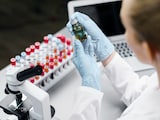Food poisoning occurs when we consume contaminated food or drinks containing harmful bacteria, viruses, parasites, or toxins. It usually leads to symptoms such as nausea, vomiting, diarrhoea, stomach cramps, fever, and weakness, which can range from mild discomfort to severe dehydration and hospitalisation in some cases. The condition is often linked to poor food hygiene, improper cooking, or unsafe storage of food. The risk of food poisoning increases during the monsoon season because high humidity and fluctuating temperatures create a favourable environment for germs to multiply in food and water. Street foods, cut fruits, and improperly stored meals are particularly unsafe at this time.
When travelling, the risk gets worse since one might eat at unhygienic places, consume contaminated water, or eat food kept out for long periods, making the digestive system more vulnerable to infections. One of the main causes for food poisoning in monsoon is bacterial growth, moist and damp conditions promote rapid multiplication of microbes like E. coli, Salmonella, and Shigella in cooked or raw food.
Eating improperly cooked or reheated meals increases the chances of infection. Another cause is contaminated water. During the rainy season, water sources often get mixed with sewage and waste, carrying harmful pathogens. Consuming untreated water or using it for washing fruits and vegetables can lead to infections. Keep reading as we share preventive tips to keep you safe from food poisoning when travelling.
Preventive tips to reduce the risk of food poisoning this monsoon while travelling
1. Drink only safe, packaged, or boiled water
Contaminated water is one of the leading causes of food poisoning during monsoon. While travelling, always carry sealed bottled water from trusted brands or use boiled and cooled water. Avoid drinking from roadside taps, local sources, or unfiltered hotel supplies, as they may contain harmful microbes.
2. Carry a reusable water bottle with a purifier
Portable water filters or purifier bottles can be lifesavers when safe water is not easily available. These remove bacteria, viruses, and heavy metals, reducing the risk of stomach infections while on the move.
3. Avoid roadside food stalls in unhygienic conditions
Street food may look tempting during monsoon, but roadside stalls often use untreated water and keep ingredients uncovered, making them prone to contamination. If you must eat street food, choose stalls that maintain cleanliness and prepare food fresh in front of you.
4. Eat freshly cooked, steaming-hot meals
Hot meals are safer because high temperatures kill most harmful bacteria. Avoid cold or pre-cooked items like cut fruits, salads, or chutneys kept out for hours, as they can harbour germs during humid monsoon weather.
5. Carry dry snacks from home
Pack healthy travel-friendly options like roasted nuts, homemade energy bars, khakra, or dry fruits. These reduce dependence on roadside food and ensure you have safe alternatives when fresh, hygienic meals are hard to find.
6. Wash or peel fruits before eating
Fruits exposed to rainwater or street dust may carry harmful microbes. Always wash them with clean water before eating. When travelling, prefer fruits that can be peeled, such as bananas, oranges, or pomegranates, to minimise exposure to contamination.
7. Use hand sanitiser or wash hands before eating
Germs from surfaces, currency, or public transport can easily transfer to your food. Wash your hands with soap and water whenever possible. If not, use an alcohol-based hand sanitiser before eating to prevent infections.
8. Avoid raw foods and salads outside
Raw vegetables and salads sold at eateries or dhabas are often washed in unsafe water, especially during monsoon. Stick to cooked vegetables and avoid mayonnaise-based dressings or raw chutneys, which spoil quickly in humid conditions.
9. Check food storage and packaging
When buying packaged foods or snacks during travel, always check the expiry date and ensure that the seal is intact. Avoid items that look soggy, smell odd, or are not properly refrigerated, such as dairy products and cold drinks with broken seals.
10. Strengthen your stomach with probiotics
Probiotic-rich foods like yogurt, buttermilk, or probiotic supplements can help maintain healthy gut bacteria, making your digestive system more resistant to infections. Carrying small packs of probiotic drinks or capsules can be especially useful while travelling during monsoon.
Follow these tips when travelling to ensure you stay safe from food poisoning.
Disclaimer: This content including advice provides generic information only. It is in no way a substitute for a qualified medical opinion. Always consult a specialist or your doctor for more information. NDTV does not claim responsibility for this information.















